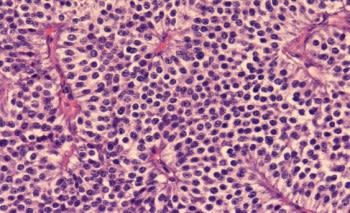Guest post for From Poverty to Power.
In July last year I was diagnosed with a pancreatic neuro-endocrine tumour. This is a rare disease and thankfully usually not as lethal as exocrine pancreatic cancer. Some people getting this news decide to take up skydiving, go bungee-jumping or get rip-roaringly drunk: I partially retreated into what Duncan would call wonkiness.
In my varied reading to try to understand this disease and how it is treated I have come across a range of articles, blogs and podcasts: some of which have been useful and interesting, others not so much.

Yup, that looks messy
Recently I listen to a podcast on the latest genetic research into pancreatic cancer on the ABC Health Report, which involved an Interview with Andrew Biankin who is Regius Professor of Surgery at the University of Glasgow. There were striking parallels with some of the recent debates on Doing Development Differently or Thinking and Working Politically, and how such approaches might be measured, notably:
The complexity and messiness of change. ‘There are some cancer cell genomes that are very quiet, there’s not a lot of chunks missing, whereas some are very unstable, and so you’ve got a lot of activity going on, big chunks of DNA are floating off, popping onto other chromosomes, and really it’s a mess.’
So, in a similar way to development processes there seem to be few, if any, single factor explanations for change. Hence the interest in methods that seek to look at combinations of factors.
The degree of uncertainty about what works, for who and the danger of averages. ‘So when you think about treating cancer you don’t think about one drug for 100 patients, you think maybe 20 drugs for 100 patients. You want to match the right drug to the right patient….So you can’t just spray the drug to everybody, you’ve got to find out who’s going to benefit from it.’
So while there may be many people with this form of cancer, their particular genetic make up means that individuals will need differing combinations – and sequencing – of treatments. Arguably not so different to the fact that many people may face a particular abuse of human rights, but how those rights might be fulfilled will take a different combination of actions and actors depending on the context.
The adoption of an approach more akin to emergent discovery, and using the ‘natural variation’ in both patients and their treatment to identify ‘signals’. ‘So what we are seeing is really just some small signals. We do what we call a discovery, where we follow our patients, almost like a clinical trial. We couldn’t change their treatment but what we could do is follow what sort of treatment they received. And we are starting to see some relationships between the sort of treatment they received just by chance and the underlying genomes.’
So this is all about trying to find explanations for variations in outcomes, with their origins in both the variations of treatment and individuals’ genetic characteristics. It is after the fact analysis, unlike designed experiments, which puts a value on natural variation which is especially useful for complex phenomena.
Identifying Exceptional Responders ‘[W]hat we are seeing in some of those circumstances is what we call exceptional responders. ….If we dig into these cancer genomes and start to understand these differences then perhaps we will understand why a particular patient responded so dramatically and why another didn’t…’
If variation in outcomes is the norm, then the nature of this variation should be explored and exploited, instead of focussing on average effects. The emphasis is on what might be called in development-speak in-depth case studies and exploring positive deviance to investigate what lies behind and contributes to particular patterns and outcomes.
The importance of picking patients rather than a random allocation over a wide group if one is really going to understand how individual patients are variety of treatments. ‘The way we’d approach it is that we would develop what we call a biomarker hypothesis. That is we have some biological marker, whether it be a genetic test or some other test, as to why we think this patient responded dramatically. We might take this into the laboratory and do a few extra experiments to understand it better, and then we change the way we perform a clinical trial. We pick the patients that we think are going to respond based on this biomarker, and we treat those patients.’
So in some cases in order to develop a testable hypothesis or dare I say it ‘theory of change’ one has to explore a limited number of selected cases in depth, and purposively choose those candidates likely to respond based on that theory.
New ways to do clinical trials are needed in order to ‘fail early and fail cheaply’ using smaller trials and stepwise approaches. In this way more approaches can be tested ‘rather than just putting your money behind one horse and hoping that it works’. But as in much of the development world ‘the system isn’t set up for it, the regulators aren’t set up for it. Changing that is going to be our biggest challenge as a community.’
So in the same way the development sector is now talking about ‘iterative adaptation’, it seems that the medical profession is also struggling with how orthodox ways of doing things can crowd out incentives for innovation.
And some of this has to be driven by patients. ‘The consumers or patients and the society in a broad sense will have to play a major role, to direct us into a changing paradigm of how we approach not just cancer but other diseases… [s]o there’s a piece about education and training that needs to happen, not only for practitioners but also for patients.’
Similarly, a number of commentators have stressed in the development arena the potential of those who are meant to benefit from the aid system, and citizens more broadly, having a greater voice in providing feedback and shaping priorities. This is important not just to improve performance but to put pressure on the ‘system’ to provide incentives for reform.
Now of course there are lots of differences between process that involve medical treatments and development processes, which are clearly not ‘treatments’ in the same way. Furthermore there are legitimate concerns about the uncritical borrowing of methods and evaluative process from one setting to another, not least when power and politics play very different roles. I am not suggesting that a replication of precisely this form of approach is appropriate for development agencies.
I am also aware there are a number of risks associated with personalised medicine, including that this emphasis might come at the cost of addressing mass diseases for which common treatments are known. Not unlike development debates about focusing on known technical solutions and the ‘science of delivery’.
However what I find interesting is that when it comes to complex problems and high levels of uncertainty, there seem to be some common generic approaches across different domains, as well as some common challenges and risks. This provides a rich terrain for exchange and learning.
I am glad to say my cancer is currently in remission following the removal of the tumour last August. You might argue I have a vested interest in seeing systemic changes in both the medical and development areas.
My thanks to Rick Davies of the excellent MandE News for his sage advice on how best to communicate some of this!











